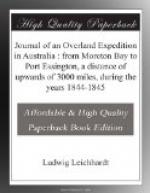We passed some very high cliffs, which showed a fine geological section of horizontal layers of sandstone and coal-slate. There were also some layers of very good coal, but the greater part of those visible were of a slaty character. Nodules of Ironstone were very frequent in the sandstone.
After having fixed upon a place to pitch the tent, and after some refreshment, I started with my two black companions upon a reconnoitring excursion along the course of the river, which made several large bends, though its general direction was to the north-east. We passed over some very fine flats of Bastard-box, silver-leaved Ironbark, and white gum, with a few scattered Acacia-trees, remarkable for their drooping foliage, and mentioned under the date 22nd December. Farther on, we came again to scrub, which uniformly covered the edge of the high land towards the river. Here, within the scrub, on the side towards the open country we found many deserted camps of the natives, which, from their position, seemed to have been used for shelter from the weather, or as hiding-places from enemies: several places had evidently been used for corroborris, and also for fighting.
On a White-gum, which has long lanceolate green leaves, I found a species of Loranthus, with leaves resembling those of the silver-leaved Ironbark (Eucalyptus pulverulentus). Having reached a point down the river, in about lat. 23 degrees 18 minutes, from which some low ranges to the N.W. became visible, I returned to the camp. At the point where it turned, a dyke of basalt traverses the river. The country still maintained its favourable character, and the river contained fine sheets of water similar to those already described, on one of which a pelican floated undisturbed by our presence. Large heaps of muscle-shells, which have given food to successive generations of the natives, cover the steep sloping banks of the river, and indicate that this part of the country is very populous. The tracks of the natives were well beaten, and the fire-places in their camps numerous. The whole country had been on fire; smouldering logs, scattered in every direction, were often rekindled by the usual night breeze, and made us think that the Blackfellows were collecting in numbers around us,—and more particularly on the opposite side of the river; added to which, the incessant splashing of numerous large fishes greatly contributed to augment our fears. As a matter of precaution, therefore, we tied our horses near our sleeping-place, and gathered the grass which grew along the edge of the water for them to eat; and it was not till daylight that our alarm vanished.
Jan. 15.—Having now ascertained, beyond a doubt, that the Mackenzie flowed to the north-east, I returned to the camp, resolved upon leaving it and renewing my course to the west-north-west and north-west; but, as it was extremely doubtful whether we should find water in travelling across the country without a leading watercourse, and as we had failed in procuring a sufficient quantity of game, I determined to take this favourable opportunity of killing a bullock before leaving the river.




